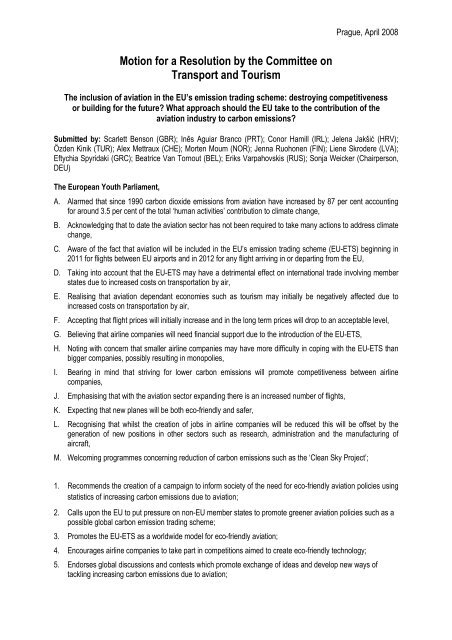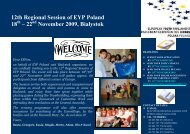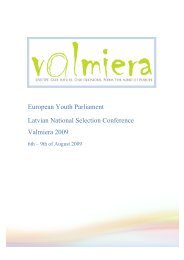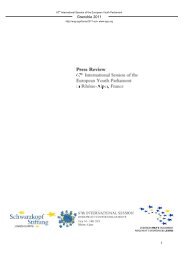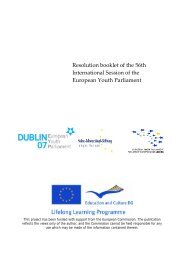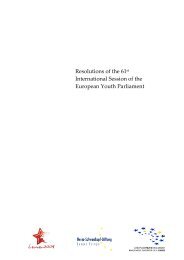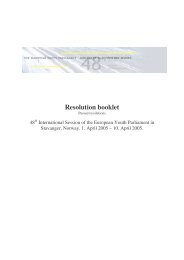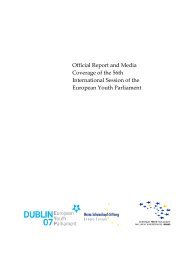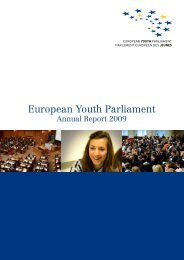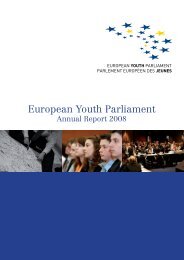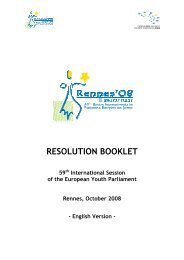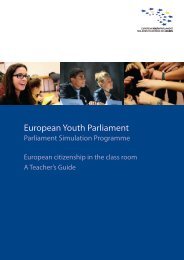Resolution - European Youth Parliament
Resolution - European Youth Parliament
Resolution - European Youth Parliament
Create successful ePaper yourself
Turn your PDF publications into a flip-book with our unique Google optimized e-Paper software.
Motion for a <strong>Resolution</strong> by the Committee on<br />
Transport and Tourism<br />
Prague, April 2008<br />
The inclusion of aviation in the EU’s emission trading scheme: destroying competitiveness<br />
or building for the future? What approach should the EU take to the contribution of the<br />
aviation industry to carbon emissions?<br />
Submitted by: Scarlett Benson (GBR); Inês Aguiar Branco (PRT); Conor Hamill (IRL); Jelena Jakšić (HRV);<br />
Özden Kinik (TUR); Alex Mettraux (CHE); Morten Moum (NOR); Jenna Ruohonen (FIN); Liene Skrodere (LVA);<br />
Eftychia Spyridaki (GRC); Beatrice Van Tornout (BEL); Eriks Varpahovskis (RUS); Sonja Weicker (Chairperson,<br />
DEU)<br />
The <strong>European</strong> <strong>Youth</strong> <strong>Parliament</strong>,<br />
A. Alarmed that since 1990 carbon dioxide emissions from aviation have increased by 87 per cent accounting<br />
for around 3.5 per cent of the total ‘human activities’ contribution to climate change,<br />
B. Acknowledging that to date the aviation sector has not been required to take many actions to address climate<br />
change,<br />
C. Aware of the fact that aviation will be included in the EU’s emission trading scheme (EU-ETS) beginning in<br />
2011 for flights between EU airports and in 2012 for any flight arriving in or departing from the EU,<br />
D. Taking into account that the EU-ETS may have a detrimental effect on international trade involving member<br />
states due to increased costs on transportation by air,<br />
E. Realising that aviation dependant economies such as tourism may initially be negatively affected due to<br />
increased costs on transportation by air,<br />
F. Accepting that flight prices will initially increase and in the long term prices will drop to an acceptable level,<br />
G. Believing that airline companies will need financial support due to the introduction of the EU-ETS,<br />
H. Noting with concern that smaller airline companies may have more difficulty in coping with the EU-ETS than<br />
bigger companies, possibly resulting in monopolies,<br />
I. Bearing in mind that striving for lower carbon emissions will promote competitiveness between airline<br />
companies,<br />
J. Emphasising that with the aviation sector expanding there is an increased number of flights,<br />
K. Expecting that new planes will be both eco-friendly and safer,<br />
L. Recognising that whilst the creation of jobs in airline companies will be reduced this will be offset by the<br />
generation of new positions in other sectors such as research, administration and the manufacturing of<br />
aircraft,<br />
M. Welcoming programmes concerning reduction of carbon emissions such as the ‘Clean Sky Project’;<br />
1. Recommends the creation of a campaign to inform society of the need for eco-friendly aviation policies using<br />
statistics of increasing carbon emissions due to aviation;<br />
2. Calls upon the EU to put pressure on non-EU member states to promote greener aviation policies such as a<br />
possible global carbon emission trading scheme;<br />
3. Promotes the EU-ETS as a worldwide model for eco-friendly aviation;<br />
4. Encourages airline companies to take part in competitions aimed to create eco-friendly technology;<br />
5. Endorses global discussions and contests which promote exchange of ideas and develop new ways of<br />
tackling increasing carbon emissions due to aviation;


